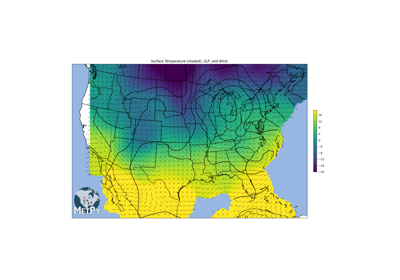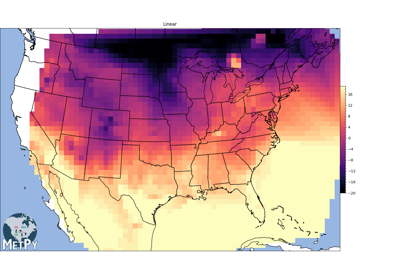interpolate_to_grid#
- metpy.interpolate.interpolate_to_grid(x, y, z, interp_type='linear', hres=50000, minimum_neighbors=3, gamma=0.25, kappa_star=5.052, search_radius=None, rbf_func='linear', rbf_smooth=0, boundary_coords=None)#
Interpolate given (x,y), observation (z) pairs to a grid based on given parameters.
- Parameters:
x (array-like) – x coordinate, can have units of linear distance or degrees
y (array-like) – y coordinate, can have units of linear distance or degrees
z (array-like) – observation value
interp_type (str) – What type of interpolation to use. Available options include: 1) “linear”, “nearest”, “cubic”, or “rbf” from
scipy.interpolate. 2) “natural_neighbor”, “barnes”, or “cressman” frommetpy.interpolate. Default “linear”.hres (float) – The horizontal resolution of the generated grid, given in the same units as the x and y parameters. Default 50000.
minimum_neighbors (int) – Minimum number of neighbors needed to perform Barnes or Cressman interpolation for a point. Default is 3.
gamma (float) – Adjustable smoothing parameter for the barnes interpolation. Default 0.25.
kappa_star (float) – Response parameter for barnes interpolation, specified nondimensionally in terms of the Nyquist. Default 5.052
search_radius (float) – A search radius to use for the Barnes and Cressman interpolation schemes. If search_radius is not specified, it will default to 5 times the average spacing of observations.
rbf_func (str) – Specifies which function to use for Rbf interpolation. Options include: ‘multiquadric’, ‘inverse’, ‘gaussian’, ‘linear’, ‘cubic’, ‘quintic’, and ‘thin_plate’. Default ‘linear’. See
scipy.interpolate.Rbffor more information.rbf_smooth (float) – Smoothing value applied to rbf interpolation. Higher values result in more smoothing.
boundary_coords (dict) – Optional dictionary containing coordinates of the study area boundary. Dictionary should be in format: {‘west’: west, ‘south’: south, ‘east’: east, ‘north’: north}
- Returns:
grid_x ((N, 2) numpy.ndarray) – Meshgrid for the resulting interpolation in the x dimension
grid_y ((N, 2) numpy.ndarray) – Meshgrid for the resulting interpolation in the y dimension numpy.ndarray
img ((M, N) numpy.ndarray) – 2-dimensional array representing the interpolated values for each grid.
See also
Notes
This function acts as a wrapper for interpolate_points to allow it to generate a regular grid.
This function interpolates points to a Cartesian plane, even if lat/lon coordinates are provided.

